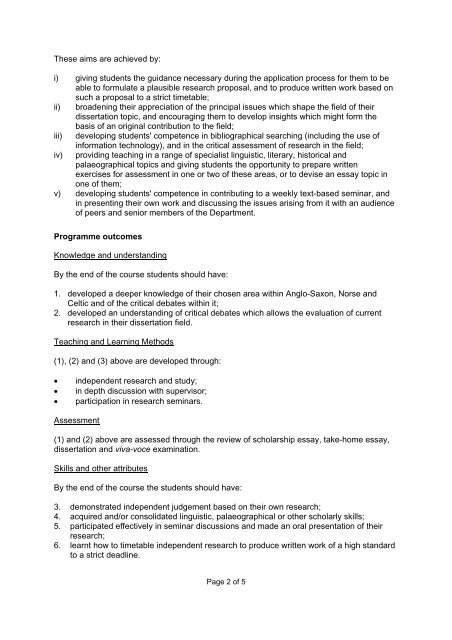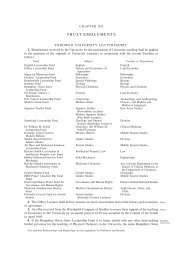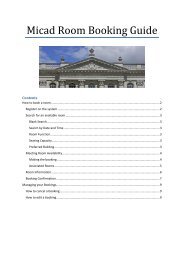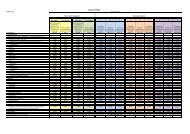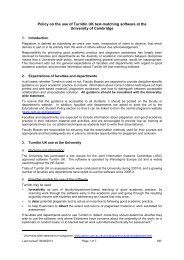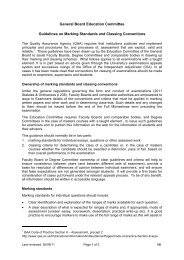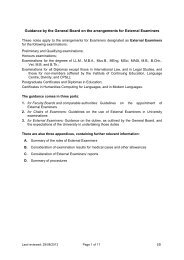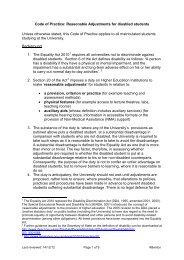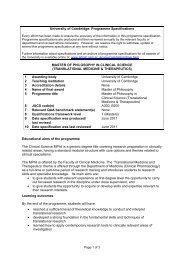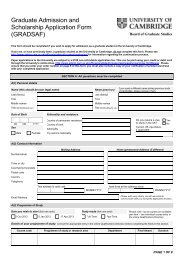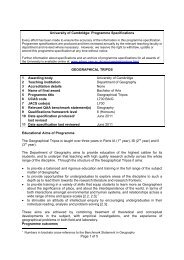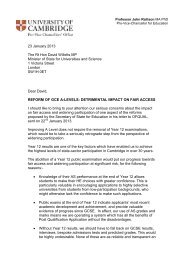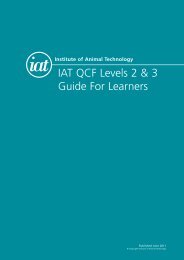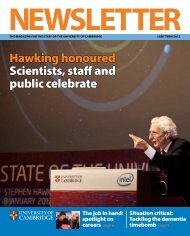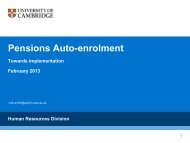Anglo-Saxon, Norse and Celtic - University of Cambridge
Anglo-Saxon, Norse and Celtic - University of Cambridge
Anglo-Saxon, Norse and Celtic - University of Cambridge
Create successful ePaper yourself
Turn your PDF publications into a flip-book with our unique Google optimized e-Paper software.
These aims are achieved by:<br />
i) giving students the guidance necessary during the application process for them to be<br />
able to formulate a plausible research proposal, <strong>and</strong> to produce written work based on<br />
such a proposal to a strict timetable;<br />
ii) broadening their appreciation <strong>of</strong> the principal issues which shape the field <strong>of</strong> their<br />
dissertation topic, <strong>and</strong> encouraging them to develop insights which might form the<br />
basis <strong>of</strong> an original contribution to the field;<br />
iii) developing students' competence in bibliographical searching (including the use <strong>of</strong><br />
iv)<br />
information technology), <strong>and</strong> in the critical assessment <strong>of</strong> research in the field;<br />
providing teaching in a range <strong>of</strong> specialist linguistic, literary, historical <strong>and</strong><br />
palaeographical topics <strong>and</strong> giving students the opportunity to prepare written<br />
exercises for assessment in one or two <strong>of</strong> these areas, or to devise an essay topic in<br />
one <strong>of</strong> them;<br />
v) developing students' competence in contributing to a weekly text-based seminar, <strong>and</strong><br />
in presenting their own work <strong>and</strong> discussing the issues arising from it with an audience<br />
<strong>of</strong> peers <strong>and</strong> senior members <strong>of</strong> the Department.<br />
Programme outcomes<br />
Knowledge <strong>and</strong> underst<strong>and</strong>ing<br />
By the end <strong>of</strong> the course students should have:<br />
1. developed a deeper knowledge <strong>of</strong> their chosen area within <strong>Anglo</strong>-<strong>Saxon</strong>, <strong>Norse</strong> <strong>and</strong><br />
<strong>Celtic</strong> <strong>and</strong> <strong>of</strong> the critical debates within it;<br />
2. developed an underst<strong>and</strong>ing <strong>of</strong> critical debates which allows the evaluation <strong>of</strong> current<br />
research in their dissertation field.<br />
Teaching <strong>and</strong> Learning Methods<br />
(1), (2) <strong>and</strong> (3) above are developed through:<br />
• independent research <strong>and</strong> study;<br />
• in depth discussion with supervisor;<br />
• participation in research seminars.<br />
Assessment<br />
(1) <strong>and</strong> (2) above are assessed through the review <strong>of</strong> scholarship essay, take-home essay,<br />
dissertation <strong>and</strong> viva-voce examination.<br />
Skills <strong>and</strong> other attributes<br />
By the end <strong>of</strong> the course the students should have:<br />
3. demonstrated independent judgement based on their own research;<br />
4. acquired <strong>and</strong>/or consolidated linguistic, palaeographical or other scholarly skills;<br />
5. participated effectively in seminar discussions <strong>and</strong> made an oral presentation <strong>of</strong> their<br />
research;<br />
6. learnt how to timetable independent research to produce written work <strong>of</strong> a high st<strong>and</strong>ard<br />
to a strict deadline.<br />
Page 2 <strong>of</strong> 5


